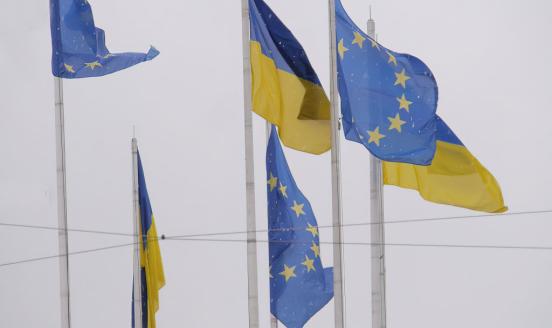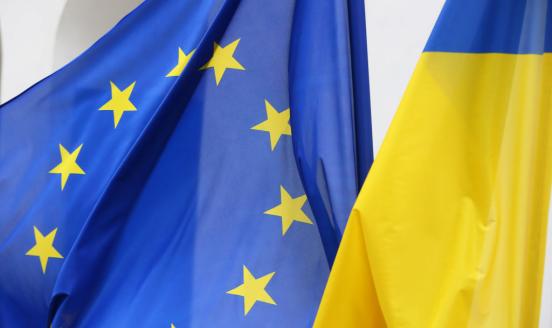Are economic and political freedoms interrelated?
Democracy has not always accompanied market economy. But in modern societies, economic and political freedoms are increasingly interconnected. Democra

Retreat of democracy
After the worldwide triumph of democracy in the 1980s and 1990s, one can observe its partial reversal in the New Millennium. This is the conclusion of two leading global political surveys – the Freedom House’s Freedom in the World (FHFiW) 2018 (Abramowitz, 2018) and the Bertelsmann Foundation’s Transformation Index (BTI) 2018 (Bertelsmann, 2018)[1].
Figure 1. The percentage of countries rated by Freedom House as “Free”, “Partly Free” and “Non Free”, 1987-2017
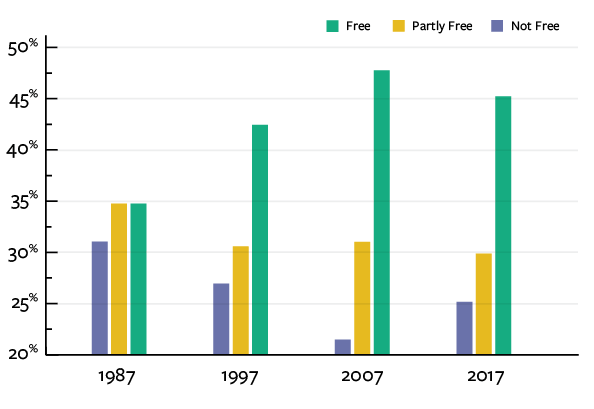
Source: Abramowitz (2018).
Figure 1 shows that between 2007 and 2017 the percentage of countries rated by the Freedom House as “Free” and “Partly Free” decreased, while the percentage of “Non Free” countries increased. Correspondingly, between 2003 and 2017 the population in countries ranked as democracies by the BTI increased from 4.0 billion to 4.2 billion, while in countries ranked as autocracies the number climbed from 2.3 billion to 3.3 billion (Bertelsmann, 2018).
The list of countries that recorded substantial deterioration in political rights and civil liberties since 2007 includes, among others, Azerbaijan, Bahrain, Burundi, Central African Republic, Congo (Brazzaville), Dominican Republic, Ethiopia, Gabon, Honduras, Hungary, Mali, Mauritania, Mexico, Nicaragua, Russia, Tajikistan, Turkey, Venezuela, and Yemen (Abramowitz, 2018). This negative trend affected not only emerging-market and developing countries with a short historical record of political freedom and democracy, but also some developed countries considered as stable democracies that suffered from the wave of political populism. For example, scores for the US deteriorated in both HFFIW and BTI surveys.
Democracy and market economy – are they interrelated?
The key question for economists is whether the observed authoritarian trends lead or will lead to more government interference/dirigisme in business activity, less economic freedom and transparency and, as a result, more distortions and macroeconomic imbalances. Before we try to answer this question, we will look into historical interrelation between democracy and market economy.
In the early stages of capitalism (18th, 19th and early 20th century), a free-market economy (with a very limited government role) was accompanied by political regimes that, by today’s standards, were either non-democratic or only partly democratic.[2] This changed gradually during the 20th century, with most of the high-income countries having both democracy and a market economy. Nevertheless, there are still many non-democratic regimes, as demonstrated by the FHFIW and BIT surveys. Among them, there are examples of both market-oriented authoritarianism (for example, in the regions of East and South East Asia and the Gulf) and anti-market and populist dictatorships (for example, in Latin America, Africa and Middle East).
On the other hand, there is no historical example of stable democracy without predominantly market economy based on private ownership. Utopian dreams of democratic central planning have never materialised.
Figure 2 plots the HFFIW 2018 scores (simple average of political rights and civil liberty scores, from 1 [the most free] to 7 [the most unfree]) against the Heritage Foundation Index of Economic Freedom (HFIEF) 2018, the synthetic measure of degree of economic freedom, macroeconomic stability and property rights protection (from 1 [the most unfree] to 100 [the most free]) for 180 countries. Both surveys present 2017 data.
The correlation between degrees of economic and political freedom is not very strong, but it exists. Hong Kong, Singapore and United Arab Emirates represent the group of countries with more economic than political freedom while Kiribati, Suriname and Timor-Leste represent the opposite asymmetry.
Figure 2. Interrelation between economic and political freedom in the world, 2017
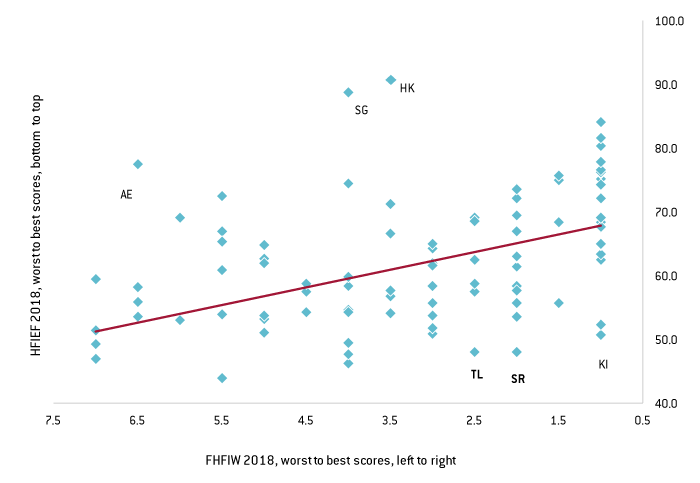
Source[3]
Crisis of “new” democracies in Europe and its neighbourhood
When one analyses the anti-democratic tendencies worldwide, the situation in the Middle East and North Africa (MENA), the former Soviet Union (FSU) and Central and Eastern Europe (CEE) looks the most worrying.
The Arab Spring of 2010-2011 raised hopes for democratisation of the MENA region. Unfortunately, such hopes were short-lived. Seven years later, only Tunisia managed to join the club of “free” countries. The situation elsewhere deteriorated dramatically, including the accession of military dictatorship in Egypt and the outbreak of civil wars in Syria, Libya, Yemen and Iraq.
In CEE and the FSU, the collapse of communism at the end of 1980s and early 1990s enabled transition to democracy and market economy. However, the democratic gains were already reversed in Central Asia, the Southern Caucasus and Belarus in the 1990s, and in Russia by the 2000s. In the 2010s, an anti-democratic drift hit part of CEE, including EU Member States and candidates such as Hungary, Poland, Macedonia and Serbia.
Since the 1990s, the Freedom House has conducted a separate survey, “Nations in Transit” (FHNIT) for CEE and FSU countries, which includes seven subcategories – Electoral Process, National Democratic Governance, Civil Society, Local Democratic Governance, Independent Media, and Judicial Framework and Independence – summarised in the synthetic Democracy Score (DS) (Schenkkan, 2018).
Since 2007, the number of countries where the DS deteriorated has systematically exceeded the number of countries where it has improved (Figure 3). The negative trend concerned all sub-regions and all subcategories.
Figure 3. Changes in FHNIT Democracy Scores, 2005-2007
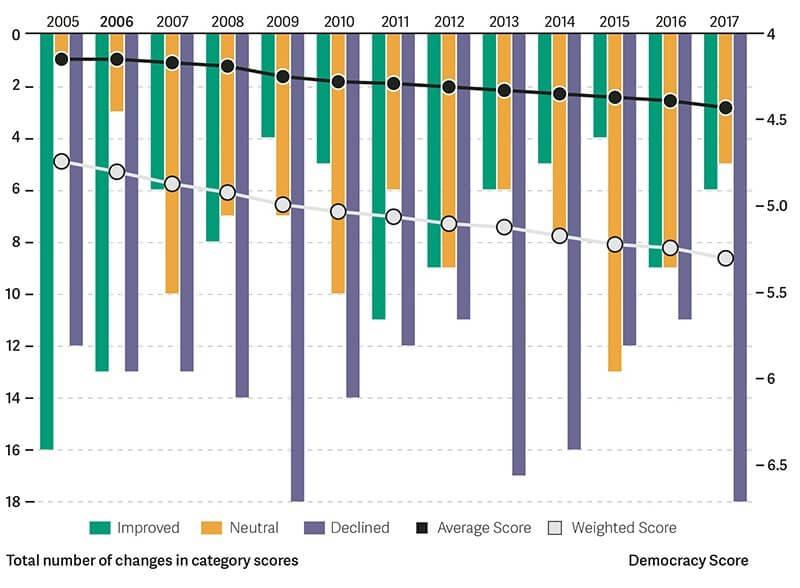
Source: Schenkkan (2018)
Does authoritarianism in the FSU and CEE negatively affect economic governance?
The short answer is yes. Figure 4 suggests a stronger correlation between economic and political freedoms as compared to the global panel (Figure 2). Three Baltic countries and the Czech Republic occupy the top-right corner of the graph – that is, they are the freest countries both economically and politically. In the bottom-left corner, there are the least free countries, both economically and politically: Belarus, Russia, Tajikistan, Turkmenistan, and Uzbekistan. Georgia and Kazakhstan represent the group of countries with more economic than political freedom, while Ukraine records less economic freedom than political.
Figure 4. Interrelation between political and economic freedom in post-communist countries, 2017
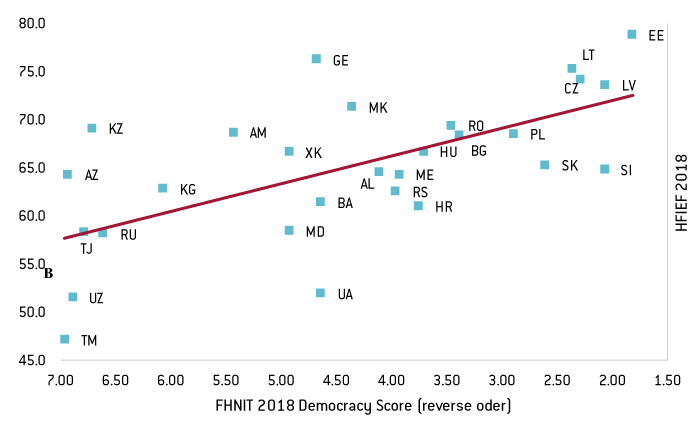
Source[4]
Historical analysis also confirms the above correlation. First, transition from a centrally planned economy to a market economy could start only when communist regimes collapsed. Second, countries that did not start democratisation (Turkmenistan and Uzbekistan) did not progress in building a market system; their economies remain largely centrally planned and administratively controlled. Third, in countries that experienced authoritarian drift, market-oriented economic reforms were either stopped or reversed. This has happened in, among others, Slovakia (1994-1998), Belarus after 1996, Russia after 2003, Macedonia, Turkey and Hungary since the beginning of 2010s, Ukraine (2010-2014) and Poland after 2015. Beyond the analysed region, the most drastic example is Venezuela under administration of Hugo Chavez and Nicolas Maduro. Fourth, there are opposite examples when progress in democratisation enabled launching or return to economic reforms: Slovakia after 1998, Serbia after 2000, Georgia after 2003, and Ukraine since 2014.
How can democracy help market economy?
There are several channels through which democracy can help in building competitive market economy and its proper functioning:
- Liberal democracy involves a system of checks and balances (for example, parliamentary and judicial control of executives), which limits concentration and abuse of political power and strengthens the rule of law;
- Liberal democracy also increases transparency of government actions, constrains opportunities for corruption, rent-seeking and the capture of state institutions by groups of interests, and creates long-term guarantee and stability of property rights;
- Democratic rotation of political elites also reduces the incidence of power abuses;
- Civil liberties support economic freedom;
- Democratic legitimacy of a government helps it take unpopular but sometimes badly needed economic decisions;
- Authoritarian countries are less open to the external world than democratic ones, which is of great importance in the era of globalisation.
The history of post-communist transitions in CEE and the FSU clearly demonstrated the advantages of early democratisation. It allowed for a limiting of the influence of the old political elite, consisting of the functionaries of the former communist parties, army, security service, old-style administration, and managers of state-owned enterprises (“red” directors), none of them enthusiasts of the market system. At the later stage (in 2000s and 2010s), authoritarian tendencies were usually accompanied by widespread corruption, state capture and an increasingly privileged position of oligarchs who were closely associated with political power and government bureaucrats.
How can market economy help democracy?
To have a complete picture, it is also worth reminding ourselves how a market economy can help in building and consolidating a liberal democracy (EBRD, 1999, Box 5.3, p.113):
- Market economy makes citizens economically independent from the government which, unlike in a centrally planned economy, is not the single owner and employer;
- It limits power of government bureaucracy and creates room not only for economic freedom but also for civil liberties;
- It helps a country’s external openness;
- It creates demand for the rule of law;
- It helps to develop civil society institutions, a broad middle class, and culture of cooperation based on self-interest, which reinforces democracy;
- Finally, a well-functioning market system helps in economic development that, in turn, creates demand for political freedom and democracy. Several authors, for example, Barro (1996), Lipset (1959), Przeworski and Limongi (1997), Fukuyama (2004) argue that countries with higher GDP per capita are more likely to be democratic than autocratic, although there are also other determinant factors. For example, availability of large natural resource rent is an obstacle to democratisation, even in countries with high GDP per capita.
Bibliography
Abramowitz, M.J. et al. (2018): Freedom in the World 2018: Democracy in Crisis, Freedom House, available at https://freedomhouse.org/report/freedom-world/freedom-world-2018
Barro, R.J. (1999): Determinants of Democracy, Journal of Political Economy, University of Chicago Press, vol. 107(S6), pp. 158-183, December
Bertelsmann (2018): Democracy under Pressure: Polarization and Repression Are Increasing Worldwide, Bertelsmann Stiftung, Press Release, 22 March, available at https://www.bertelsmann-stiftung.de/en/press/press-releases/press-release/pid/democracy-under-pressure-polarization-and-repression-are-increasing-worldwide/
EBRD (1999): Transition Report 1999: Ten Years of Transition, London: European Bank for Reconstruction and Development, available at https://www.ebrd.com/publications/transition-report-1999-english.pdf
Fukuyama, F. (2004): State Building: Governance and World Order in the 21st Century, Ithaca, NY: Cornell University Press
Fukuyama, F. (2015): Political Order and Political Decay: From the Industrial Revolution to the Globalisation of Democracy, Paperback edition, London: Profile Books.
Lipset, S.M. (1959): Some Social Requisites of Democracy: Economic Development and Political Legitimacy, American Political Science Review, Vol. 53(1), pp. 69-105
Przeworski, A. and Limongi, F. (1997): Modernization: Theories and Facts, World Politics, Vol. 49(2), pp.155-183
Schenkkan, N. (2018): Nations in Transit 2018: Confronting Illiberalism, Freedom House, available at https://freedomhouse.org/report/nations-transit/nations-transit-2018
Footnotes
[1] This is an expanded version of author’s presentation on “Interdependence between market economy and democracy” delivered to the Committee on Political Affairs and Democracy of the Parliamentary Assembly of the Council of Europe in Paris, on 11 September 2018.
[2] Even if the executive branch of government was democratically elected (the US) or accountable to democratically elected parliament (the UK, France and couple of other European countries) the franchise was limited, excluding women, people with lower material status, former slaves, etc. Universal franchise became a norm in Europe only after the WWI. See Fukuyama (2015) for historical analysis of democratic systems.
[3] https://freedomhouse.org/sites/default/files/Country%20and%20Territory%20Ratings%20and%20Statuses%20FIW1973-2018.xlsx; https://www.heritage.org/index/excel/2018/index2018_data.xls
[4] https://freedomhouse.org/report/nit-2018-table-country-scores; https://www.heritage.org/index/excel/2018/index2018_data.xls


